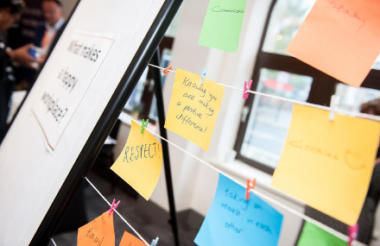Diversity is beautiful
The conference began with the writer, actor and comedian Francesca Martinez sharing her experiences of living with a disability.
“We need to celebrate difference,” she said.
She called for people to “use more positive names” to describe conditions and uses the term “wobbly” to describe the effects of her own brain damage.
She told delegates that it was difficult growing up “in a world that views me as abnormal” as the focus was on what she couldn’t do, rather than what she could, which was isolating at times.
Martinez added that “we all have things that we struggle with” and said society needs to be better at accepting and embracing people’s differences.
“Any suffering I have had in my life has not been because I have been wobbly but because I’ve lived in a world that can’t handle difference,” she said.
Building resilience
Sarah Pryce, chair of Cornwall Air Ambulance and a personal development consultant, gave delegates her seven steps for building resilience.
She said resilience didn’t mean you could keep going “until you break”, but was about “bounceability” and being able to adapt to changing situations.
Her seven steps are:
1. Be clear about what you want to achieve
2. Do a few things well, rather than a lot of things
3. Play to your strengths
4. Build great networks
5. Find you passion
6. Stay true to your values
7. Play truant, and take time away from work
Delivering a diversity and inclusion programme
Victim Support’s diversity and inclusion lead, Natasha Broomfield-Reid, led a session explaining how her charity has embedded diversity and inclusion.
She said diversity and inclusion was particularly important for Victim Support because of the nature of its activities – supporting victims of crime.
“We need to make sure that we are supporting a whole range of people,” she said, and everyone needs to be “met with an equitable service”.
Victim Support has a range of diversity and inclusion awards and kitemarks – including being in Stonewall’s list and being a Disability Confident Employer.
But she said: “It is not an overnight job” and that “there is always more to do”.
She said it’s important that the project has buy in from the senior leadership team and that they are visible in supporting the programme because culture change is a key part.
Other useful tools were creating inclusion champions within teams, ongoing training for everyone and embedding targets within departmental plans so that it is everyone’s responsibility.
But also there should be one person whose job is to drive it, because “if you don’t have someone leading it really does not progress”.
The lead also needs to be senior enough to “make decisions” and “challenge senior leaders”.
Creating a workplace that supports inclusion
Arthritis Research UK used its recent office move as a way to help the charity improve accessibility.
Cherry White, project officer, said it started when the charity needed to renew the lease on its old building and realised that the step to get in made it difficult for people with mobility issues.
She said designing appropriate workplaces is important to enable more people to continue working for longer and that there is a “relationship between the working environment and the culture of how we work”.
The new office has a mix of open plan seating, quiet zones and private meeting areas. There is a wellness room where people can go to stretch or excise as needed.
Arthritis Research UK also invested in ICT to enable more working from home and is flexible about the hours people have to be in, with 11am to 3pm being core hours.
‘Uncomfortable’ conversations about race
Charities do not reflect the people they seek to serve and if leaders do not start having “uncomfortable” conversations about race they will risk losing out on talent and donations in the future, warned sector experts yesterday.
Experts were taking part in a panel discussion titled Challenging racial inequality and prejudice in charity leadership.
Opening the discussion, Rob Berkley, a trustee of the Baring Foundation, said the sector faced a “massive challenge”. He said it should be responding to the digital revolution, ageing population, climate change and other challenges and opportunities facing the sector, but that some black, Asian and other minority ethnic people did not look to the charity sector, because it does not reflect them.
“They look at us and we don’t even look like them,” he said, and they don’t “feel as if this is the hub of that social change," and "that is a problem not for them, but for us".










